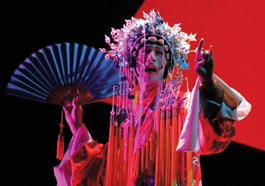home | metro silicon valley index | the arts | stage | preview
2006 Fall Arts Issue:
Intro | Stage | Classical | Performing Arts | Visual Arts | Venue Finder | Music | Movies | Festivals
2006 Fall Arts Issue
Falling Forward
AFTER THE spectacles of summer, from race cars to digital art to outdoor jazz, come the seasons of the fall, as orchestras, theater troupes, ballet companies and museums unveil their schedules. This autumn brings some adventurous productions and exhibits to the area, including M. Butterfly at TheatreWorks with cover subject Francis Jue in the lead role (see interview below) and the first part of Tony Kushner's epic Angels in America at City Lights; the gravity-dismissing Diavolo Dance Company at Stanford Lively Arts and tap-dancing dervish Savion Glover at Montalvo; an Elvis Costello classical premiere at Redwood Symphony and a Shostakovich celebration at Symphony Silicon Valley; the marvels of South American painting in the 17th and 18th centuries at the Cantor Arts Center and the art of modern sprawl of "Suburban Escape" at the San Jose Museum of Art. Metro's own Richard von Busack and Todd Inoue weigh in with their recommendations for the movies and concerts of the season.
Our annual Fall Arts issue covers the best options in music, dance, stage, art and movies from the end of August to the end of the year.
—Michael S. Gant
The Many Stages of 'M. Butterfly'
Playwright David Henry Hwang and actor Francis Jue reflect on the metamorphosis of the hit play
By Marianne Messina
SUPPOSEDLY, great literature can be revisited at different points in a lifetime and always reveal new truths. One hardly expects the maxim to apply to the work's creator. Yet playwright David Henry Hwang says that over the nearly 20 years since he wrote his play M. Butterfly, his perspective on his two lead characters has done a turnabout. Playing off the story of Puccini's opera Madame Butterfly, which opens TheatreWorks' fall season this week, Hwang's M. Butterfly concerns a similarly tragic East-West love relationship, except instead of the American Lt. Pinkerton in Japan, Hwang placed a French diplomat Gallimard in China. And as the submissive female, Puccini's Japanese "Butterfly" becomes Hwang's Chinese opera singer, Song.
Oh, and Song isn't female. "Originally, I saw the play more as Gallimard's tragedy," Hwang explains. "Song was ambivalent at the end, but he was basically triumphant ... he's done his assignment, and he's fooled this man for 20 years. Nowadays, I'm aware of the degree to which the play is Song's tragedy also. I mean both of them end up spending 20 years in a relationship where love is simply illusion."

Hwang based the play on a news article about a French espionage case with the unusual gender-bending twist—the man giving away French secrets to his Chinese lover/spy believed the spy to be a woman the whole time they lived together.
First produced (1988) in an era before The Crying Game, the play became about gender issues for many audiences. When Hwang attended a production in early post-communist Russia, these elements took on celebratory importance, an eye-opener Hwang enjoyed. "M. Butterfly was sort of like Hair for them," Hwang recalls.
"This was in the early '90s. It was a sign they could talk about bisexuality; they could do nudity. It was for them a statement of social liberation."
Though the play takes place when the French were deciding to pull out of Vietnam and the Americans were deciding to go in, Hwang senses that for today's audiences M. Butterfly resonates politically with the war in Iraq: "The play is to some extent about willful self-delusion on the part of the West in terms of its relationship with other countries."
Hwang points out that at a recent production in Washington, D.C., the audience laughed at the French ambassador's comment, "Americans always like to hear how welcome they are."
"Iraq is an M. Butterfly war," Hwang comments, "because we thought they would love us."
It's not just audiences and playwright who have evolved along with this multilayered play. Actor Francis Jue, who'll be reprising his role as Song at TheatreWorks after 10 years, still finds fascinating questions in the shadowy psychology of these relationships, especially the one between Song and Comrade Chin, the woman who gives Song his orders from the Communist Party.
"I don't think that I can be as blatantly dismissive of her as I think I played it in the past," Jue says, "because I think that we really need to understand how dangerous this woman is, even if I [Song] disagree with her and know that I'm right."
Jue has come to believe that Chin, like Suzuki in Madame Butterfly, "represents something much larger than just her role ... [she] represents the world in which Butterfly must operate." But Comrade Chin is less benign. "Suzuki doesn't beat Butterfly up. But Comrade Chin is allowed to, and I think that it's a reminder that as powerful as any of us may feel at any given moment, we're part of something larger than ourselves. And we tread on dangerous ground when we forget that."
Going into rehearsal, Jue still had many questions. He wondered about "the level to which Butterfly buys into his own idea of ideal femininity and idealized love. And then I also have questions of Gallimard's complicity in that illusion—or is he simply victim?"
Gender politics to wartime politics, the line between illusion and reality blurring on endless levels—M. Butterfly is probably not going to wrap up neatly and fade away anytime soon.
M. Butterfly, a TheatreWorks production, runs Aug. 23-Sept. 17 at the Mountain View Center for the Performing Arts. Tickets are $20-$55. (650.903.6000)
Send a letter to the editor about this story.
|
|
|
|
|
|